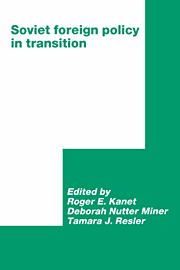Book contents
- Frontmatter
- Contents
- List of tables
- List of contributors
- Preface
- Introduction
- Part I The Soviet Union and the international political system
- Part II The Soviet Union and Europe
- Part III The Soviet Union and the developing world: global trends
- Part IV The Soviet Union and the developing world: regional and country case studies
- 8 Soviet policy in Central America during the Gorbachev period
- 9 The Soviet reassessment of socialist orientation and the African response
- 10 Soviet policy in the Middle East: Gorbachev's imprint
- 11 The implications of perestroika for the Third World, particularly Asia
- 12 The Soviet Union and Indochina
- 13 Gorbachev's Southeast Asia policy: new thinking for a new era?
- 14 The impact of Gorbachev's new thinking on Soviet policy toward South Korea
- Part V Conclusion
- Index
9 - The Soviet reassessment of socialist orientation and the African response
Published online by Cambridge University Press: 05 February 2012
- Frontmatter
- Contents
- List of tables
- List of contributors
- Preface
- Introduction
- Part I The Soviet Union and the international political system
- Part II The Soviet Union and Europe
- Part III The Soviet Union and the developing world: global trends
- Part IV The Soviet Union and the developing world: regional and country case studies
- 8 Soviet policy in Central America during the Gorbachev period
- 9 The Soviet reassessment of socialist orientation and the African response
- 10 Soviet policy in the Middle East: Gorbachev's imprint
- 11 The implications of perestroika for the Third World, particularly Asia
- 12 The Soviet Union and Indochina
- 13 Gorbachev's Southeast Asia policy: new thinking for a new era?
- 14 The impact of Gorbachev's new thinking on Soviet policy toward South Korea
- Part V Conclusion
- Index
Summary
Since Mikhail Gorbachev became Secretary General of the Communist Party of the Soviet Union (CPSU) in 1985 and the concepts of new thinking, openness, and restructuring were added to the Soviet lexicon on international relations, many interesting debates have arisen among Soviet academics and politicians about international politics in general and relations with the Third World in particular. The latter will be the main focus of this chapter.
Naturally, Gorbachev did not initiate this debate, and neither are debates about international relations anything new in the Soviet Union. What is new is the fact that Gorbachev's policies have lent a new dimension to these debates and have opened for discussion aspects previously considered outside the parameters of permissible academic debate. To the extent that Soviet social scientists responded to the new openness several key doctrinal concepts of the past, based on Marxist–Leninist philosophical assumptions, have been questioned. One of these was the concept of “non-capitalist development” (also referred to as “socialist orientation”) for Third World countries.
The amendments made to the latter will be examined, first, within the broader context of the recent Soviet reevaluation of international relations theory, whereafter the discussion will focus on the adaptations to and the eventual demise of the theory of socialist orientation in Soviet literature. In conclusion the African response to the reassessment in the Soviet Union will be briefly addressed.
- Type
- Chapter
- Information
- Soviet Foreign Policy in Transition , pp. 180 - 195Publisher: Cambridge University PressPrint publication year: 1992



